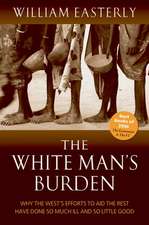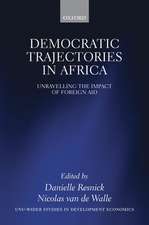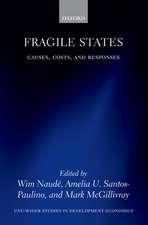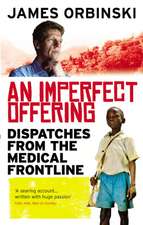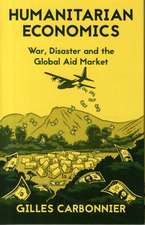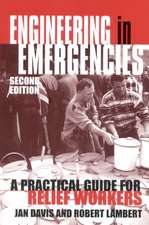Aid for Elites: Building Partner Nations and Ending Poverty through Human Capital
Autor Mark Moyaren Limba Engleză Paperback – 6 mar 2016
Preț: 284.39 lei
Nou
Puncte Express: 427
Preț estimativ în valută:
54.44€ • 59.15$ • 45.76£
54.44€ • 59.15$ • 45.76£
Carte tipărită la comandă
Livrare economică 21 aprilie-05 mai
Preluare comenzi: 021 569.72.76
Specificații
ISBN-13: 9781107565012
ISBN-10: 1107565014
Pagini: 304
Dimensiuni: 152 x 227 x 15 mm
Greutate: 0.37 kg
Editura: Cambridge University Press
Colecția Cambridge University Press
Locul publicării:New York, United States
ISBN-10: 1107565014
Pagini: 304
Dimensiuni: 152 x 227 x 15 mm
Greutate: 0.37 kg
Editura: Cambridge University Press
Colecția Cambridge University Press
Locul publicării:New York, United States
Cuprins
1. Pathways to development; 2. How governments work; 3. Civilization; 4. Human capital development; 5. Human capital and national security; 6. Training; 7. Militarization; 8. Education in the third world; 9. Education in the United States; 10. Support; 11. Measurement; 12. Conclusion: a new foreign assistance strategy.
Recenzii
'Mark Moyar has written a compelling critique of the prevailing practices and underlying logic of the development community and its approach to foreign aid. He draws upon an impressive intellectual lineage in his broader arguments about the importance of culture and civilization. He is especially critical of the Annales School of Braudel and its adherents. In doing so, Moyar argues that the predominant emphasis on development itself, including policies and infrastructure, is largely misplaced and that the building of human capital, including training of elites, effective governance, and the provision of a stable security environment, constitutes an essential sine qua non for progress in the developing world.' Robert J. Lieber, Georgetown University
'Mark Moyar's brilliantly argued and thoroughly researched new book is a fine contribution to the debate over more effective development theory and practice. He writes as a pro-aid conservative unfettered by the heavy ideological baggage of the egalitarian left which has for too long dominated (and distorted) the debate on aid reform. Aid for Elites should be added to the reading list of all development professionals.' Andrew S. Natsios, George H. W. Bush School of Government and Public Service, Texas A & M University
'In Aid for Elites Mark Moyar makes a brilliantly argued and compelling case for reviving efforts to invest in human capital as a cornerstone in the development of nations. He analyzes how human capital is the make or break - and often ignored - component in establishing and maintaining functioning institutions. He explains the missteps and faulty logic that saw the US foreign and development policy establishment ditch their large scale programs investing in people in the 1950s and 60s - in favor of an overemphasis on primary education and over reliance on expensive, foreign technical assistance. Re-establishing initiatives in training and education - with necessary adaptations - could present a far cheaper and more effective way than the current set of practices to promote security, rule of law and development. Policy makers and students of security and development alike would be wise to give this book and its recommendations serious attention.' Clare Lockhart, Institute for State Effectiveness, Washington, DC
'Mark Moyar's brilliantly argued and thoroughly researched new book is a fine contribution to the debate over more effective development theory and practice. He writes as a pro-aid conservative unfettered by the heavy ideological baggage of the egalitarian left which has for too long dominated (and distorted) the debate on aid reform. Aid for Elites should be added to the reading list of all development professionals.' Andrew S. Natsios, George H. W. Bush School of Government and Public Service, Texas A & M University
'In Aid for Elites Mark Moyar makes a brilliantly argued and compelling case for reviving efforts to invest in human capital as a cornerstone in the development of nations. He analyzes how human capital is the make or break - and often ignored - component in establishing and maintaining functioning institutions. He explains the missteps and faulty logic that saw the US foreign and development policy establishment ditch their large scale programs investing in people in the 1950s and 60s - in favor of an overemphasis on primary education and over reliance on expensive, foreign technical assistance. Re-establishing initiatives in training and education - with necessary adaptations - could present a far cheaper and more effective way than the current set of practices to promote security, rule of law and development. Policy makers and students of security and development alike would be wise to give this book and its recommendations serious attention.' Clare Lockhart, Institute for State Effectiveness, Washington, DC
Notă biografică
Descriere
Foreign aid can be made much more effective by shifting emphasis from poverty alleviation to leadership cultivation and cultural transformation.


